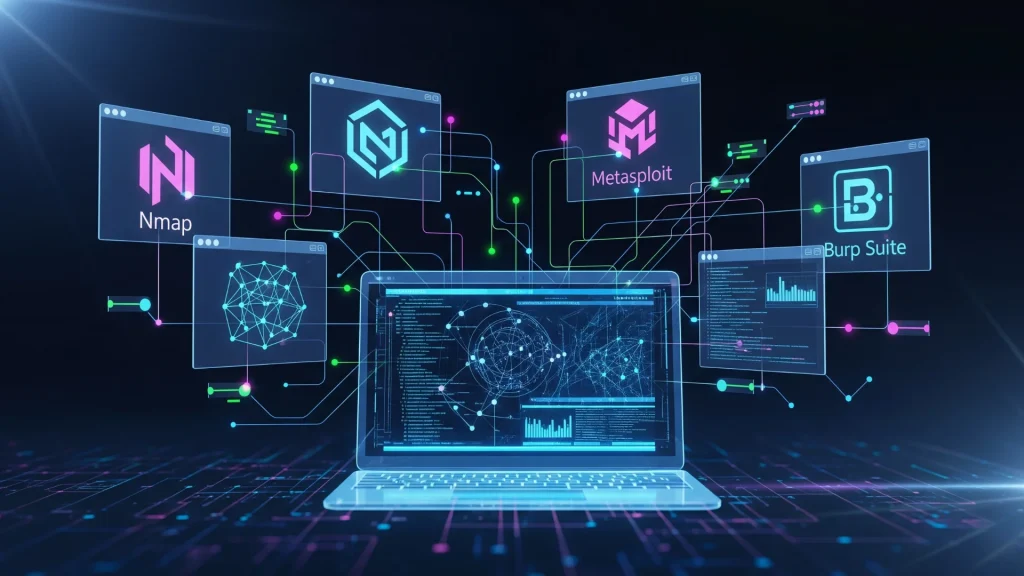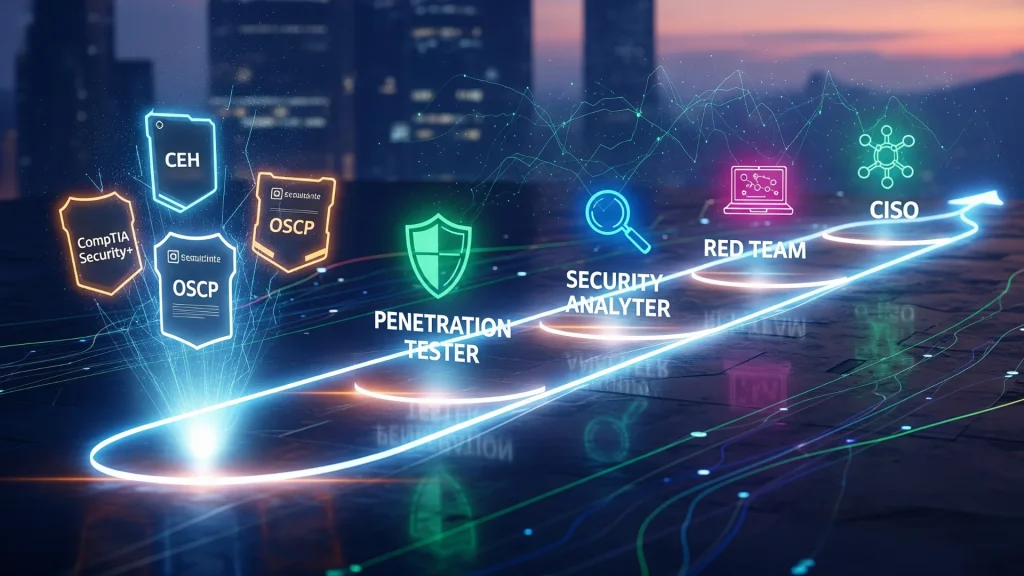What Is Ethical Hacking?
Ethical Hacking is the practice of testing and evaluating computer systems, networks, and applications for security vulnerabilities — but with permission from the owner. Unlike malicious hackers, ethical hackers operate under strict legal agreements to identify weaknesses before cybercriminals exploit them.
The core purpose of ethical hacking is proactive defense. By simulating real-world cyberattacks, ethical hackers can uncover flaws in firewalls, misconfigured servers, outdated software, and insecure coding practices. These findings help organizations patch vulnerabilities, strengthen defenses, and protect sensitive data.
Some common objectives of ethical hacking include:
- Identifying weaknesses in systems before attackers do.
- Testing security measures against simulated attacks.
- Providing actionable reports for fixing vulnerabilities.
- Improving overall cyber resilience.
Ethical hacking has grown into a recognized discipline within cybersecurity. Governments, corporations, and even small businesses now employ certified professionals to run penetration tests, conduct security audits, and ensure compliance with industry regulations. This demand has turned ethical hacking into a respected and lucrative career path.
Is Ethical Hacking Legal?

The legality of ethical hacking depends entirely on authorization. If performed without consent, it becomes illegal hacking — a criminal offense in most jurisdictions. However, when done under a signed agreement or contract, ethical hacking is perfectly legal and even encouraged.
A Scope of Work document typically outlines:
- Which systems can be tested.
- Which tools and techniques are allowed.
- When and how tests will be conducted.
- How results will be reported.
Failing to define these boundaries can lead to legal trouble, even for a well-meaning security tester. Ethical hackers must also comply with data protection laws such as GDPR in Europe or KVKK in Türkiye, ensuring sensitive information is handled securely.
In summary:
- With permission → Legal Ethical Hacking.
- Without permission → Illegal hacking (criminal activity).
This legal distinction is why aspiring ethical hackers must learn not only technical skills but also cybersecurity law and professional ethics.
Tools Used by Ethical Hackers

Ethical hackers rely on a variety of tools to perform penetration tests, vulnerability scans, and security audits. These tools range from open-source utilities to advanced commercial platforms.
The main categories include:
- Reconnaissance tools – to gather information about targets.
- Scanning tools – to identify live hosts, open ports, and services.
- Exploitation frameworks – to simulate attacks and test vulnerabilities.
- Web application testing tools – to find flaws in websites and APIs.
Nmap, Metasploit, Burp Suite
Nmap (Network Mapper)
A powerful open-source tool for network discovery and security auditing. Nmap is used to scan IP addresses, identify running services, detect open ports, and uncover network vulnerabilities. Ethical hackers use it in the early stages of penetration testing to map the attack surface.
Metasploit Framework
A widely used penetration testing platform that allows ethical hackers to develop, test, and execute exploits. Metasploit comes with hundreds of pre-built modules to simulate real-world attacks, making it ideal for testing both network and application-level defenses.
Burp Suite
A professional-grade tool for web application security testing. Burp Suite allows testers to intercept, analyze, and manipulate HTTP requests and responses. It’s especially useful for identifying vulnerabilities like SQL injection, cross-site scripting (XSS), and insecure authentication.
While these three are essential, ethical hackers may also use tools like Wireshark, Aircrack-ng, John the Ripper, and Nessus for specialized tasks.
Career Paths in Ethical Hacking

The demand for ethical hacking professionals is skyrocketing as cyber threats grow in frequency and sophistication. There are several career paths available, each with unique responsibilities and skill requirements:
- Penetration Tester (Pentester)
Specializes in simulating cyberattacks to uncover security flaws in networks, systems, and applications. - Security Analyst
Monitors systems for unusual activities, investigates potential breaches, and recommends preventive measures. - Vulnerability Assessor
Focuses on identifying and prioritizing vulnerabilities without necessarily exploiting them. - Red Team Specialist
Works as part of an offensive security team to mimic real-world attacks and challenge defensive teams. - Security Consultant
Advises organizations on security best practices, compliance requirements, and strategic defense measures.
Salaries in ethical hacking vary depending on location, certification level, and experience. In Türkiye, entry-level positions might start around ₺25,000 – ₺35,000/month, while senior consultants and specialized penetration testers can earn significantly more.
Beyond salaries, one of the most appealing aspects of a career in ethical hacking is its industry diversity. Ethical hackers are in demand across sectors including:
- Finance & Banking – protecting sensitive customer data and transaction systems.
- Healthcare – safeguarding patient records and complying with strict regulations.
- E-commerce – defending against payment fraud and website breaches.
- Telecommunications – ensuring secure communication channels and preventing interception.
- Government & Defense – preventing espionage, securing critical infrastructure, and protecting national security.
As technology evolves, so do the opportunities. Ethical hackers can specialize in:
- Cloud Security – protecting AWS, Azure, and Google Cloud infrastructures.
- IoT Security – securing connected devices in smart homes, manufacturing, and transportation.
- Mobile Application Security – testing Android and iOS apps for vulnerabilities.
- Cyber Threat Intelligence – gathering and analyzing data to anticipate attacks before they happen.
Career progression often follows a clear path: starting as a junior penetration tester, moving into a senior tester or red team role, and eventually advancing into security architecture, management, or even CISO (Chief Information Security Officer) positions. Many experienced ethical hackers also branch into independent consulting or cybersecurity entrepreneurship, creating their own testing firms or training academies.
The field is not just about finding vulnerabilities — it’s about building trust. Skilled ethical hackers become long-term partners for organizations, guiding them through an ever-changing cyber threat landscape and ensuring they stay one step ahead of attackers.
Certifications: CEH, OSCP and More
Certifications validate an ethical hacker’s skills and make them more competitive in the job market. Some of the most respected certifications include:
- CEH (Certified Ethical Hacker)
Offered by EC-Council, CEH covers a broad range of hacking tools, techniques, and methodologies. It’s one of the most recognized certifications for newcomers. - OSCP (Offensive Security Certified Professional)
Known for its hands-on approach, OSCP is highly regarded in the penetration testing community. Candidates must pass a rigorous practical exam that involves exploiting multiple vulnerable machines. - CompTIA Security+
An entry-level certification that covers foundational security concepts, ideal for beginners looking to step into ethical hacking. - GPEN (GIAC Penetration Tester)
Offered by SANS Institute, GPEN focuses on advanced penetration testing techniques.
Choosing the right certification depends on career goals, budget, and preferred learning style. Many professionals start with CEH for broad exposure, then move to OSCP for hands-on expertise.
When choosing a certification, consider:
- Your experience level: Beginners benefit from entry-level certs like CompTIA Security+ to build a solid security foundation.
- Career goals: If you want a well-known and respected title, CEH (Certified Ethical Hacker) is a great choice for ethical hacking roles worldwide.
- Hands-on skills: For practical, real-world hacking skills, OSCP is highly recommended. It focuses on labs and a tough practical exam.
You can also explore niche certifications for specialties such as:
- Cloud Security (e.g., CCSP)
- Digital Forensics (e.g., CHFI)
From an SEO perspective, certifications like CEH and OSCP are commonly mentioned in job ads and industry content related to ethical hacking. Adding these to your resume improves your chances of being found by employers searching for ethical hacking skills.
Many professionals follow a path like this:
- Start with Security+ or CEH to get foundational knowledge.
- Advance to OSCP for in-depth, hands-on ethical hacking skills.
- Add specialized certs to stand out in specific areas.
Choosing the right certification helps you grow your career and boosts your visibility in the cyber security field.
Final Thoughts
Ethical hacking is more than just a technical skill — it’s a discipline that combines technology, law, and critical thinking. With cyberattacks becoming more sophisticated, organizations are eager to hire professionals who can think like attackers but act as defenders.
If you’re passionate about technology, problem-solving, and cybersecurity, ethical hacking offers a rewarding and future-proof career path. By mastering the right tools, understanding the legal landscape, and earning recognized certifications, you can play a vital role in securing the digital world.
Take the Next Step with Bilişim Academy
Ready to start your journey in Ethical Hacking? At Bilişim Academy, we offer comprehensive cybersecurity training programs, including CompTIA Security+, CEH, and advanced penetration testing modules. Our seasoned instructors, hands-on labs, and internationally recognized certifications will give you the skills and confidence to excel in this high-demand field.
In collaboration with our trusted SEO and Media Planning partner, we are proud to deliver cybersecurity education supported by strategic digital expertise.
Visit Bilişim Academy today and take the first step toward becoming a certified ethical hacker.




